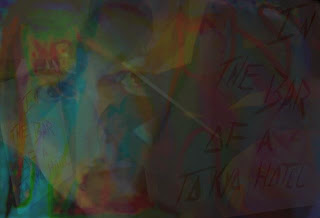
In the Bar of a Tokyo Hotel is a play by Tennessee Williams that was never thought to amount to anything by most critics, but 40 years later, theater goers are breathing new life into a story that just won't die.
The play is a love story, of sorts, between a husband and wife who have come to the end of a long, mad road that ends in death. In true Tennessee fashion, his leading lady, Miriam, is an elegant, strong minded woman who has "Blanche" like qualities. She is beautiful, but vain, and seems to have an inability to truly love anyone. But, just when you think there is no love in her, you see small glimpses of humanity that makes you think twice.
For me, Tennessee always had a way, a gift you could say, of taking his characters who have wretched qualities that would make me detest them so, but by the end of the play, I would be left feeling pity and empathy. This is how I feel about Miriam.
Miriam is married to Mark, a crazed painter, who seems to have gone completely mad. They venture to Tokyo and end up in a hotel where Mark locks himself in his room to create his masterpiece. He screams at his paintings, he rolls around naked, and he even convinces himself that he has invented color. While Miriam spends the majority of her time in the bar plotting how to rid herself from the burden of Mark's madness, she drinks herself into her own oblivion, and unsuccessfully tries to seduce the hotel's barman into her sexual web.
This past winter, I met a man named Shashi Balooja. Balooja is a talented actor and producer who had just performed in a reading I attended in East Hampton, NY at Guild Hall. I heard he was working on a Tennessee Williams project and I had to talk to him after the show. I was introduced to him through a mutual acquaintance, and he told me he was working on In the Bar of a Tokyo Hotel. Even though I had never even read the play before, I told him how much I loved Tennessee and that I would love to be part of the production somehow.
We began corresponding and I offered to come meet him in NYC to talk in person about the production. When we met to work together for the first time, he gave me the script, we talked Tennessee, and I shared with him a PBS documentary called "Wounded Genius," a biography that documents Williams' life.
It was the first time I had ever met anyone who shared the same passion for Tennessee that I had, and it was one of the most inspiring days. We made a plan to creatively collaborate further on the production, and a friendship was born.
I read in "Memoirs," written by Tennessee Williams himself, that around the time that he wrote In the Bar of a Tokyo Hotel, he was suffering himself from his own form of madness fighting depression and alcoholism. He wrote of falling down all the time. The character of Mark falls down all the time, and aside from his artistic madness, he is suffering from alcoholism.
"My next play in the sixties was In the Bar of a Tokyo Hotel. I was still always falling down during this time and I would always say, before falling, 'I'm about to fall down,' and almost nobody, nobody ever caught me," said Williams.
Not long after the play opened, to might I add, horrible and unmerciful reviews, Tennessee's brother, Dakin, had him institutionalized for a period of time.
Tennessee seemed to always put traits of himself into his characters that were identifiable to others, so beautiful, but a dangerous vulnerability. Whether his problem of falling down and alcoholism is reflected in Mark cannot be said for sure, but it is too strong of a connection to ignore.
Was Mark the painter really crazy, or was he just a sensitive man in severe emotional pain that nobody understood, or cared to understand?
Photo Credit: Media at Large
No comments:
Post a Comment